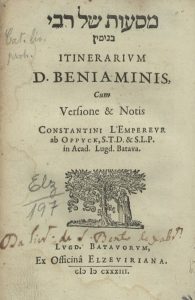Overview of Twelfth-Century Jewish Settlements, Benjamin of Tudela’s Twelfth-Century Travelogue
These cities contain many eminent scholars; the congregations are on the best terms with one another, and are friendly toward strangers. Whenever a traveler visits them they are rejoiced thereat and hospitably receive him. They are full of hopes, and say- “Be of good spirit, dear brethren, for the salvation of the Lord will be quick, like the twinkling of an eye; and, indeed, were it not that we had doubted hitherto that the end of our captivity had not yet arrived, we should have assembled long ago; but this is impossible before the time of song arrive, and the sound of the cooing turtle gives warning; then will the message arrive, and we will say, The name of the Lord be exalted!”
They send letters to one another, by which they exhort to hold firm in the Mosaic law. Those that spend their time as mourners of the downfall of Sion and the destruction of Jerusalem are always dressed in black clothes, and pray for mercy before the Lord, for the sake of their brethren.
Beside the cities which we have already mentioned as being in Germany, there are, further, Astransburg, Duidisburg, Mantern, Pisingas, Bamberg, Zor, and Regensburg, on the confines of the empire; all these cities contain many rich and learned Jews. Farther on is the country of Bohemia, called Prague. Here begins Sclavonia, called by the Jews who inhabit it Khenaan, because the inhabitants sell their children to all nations, which is also applicable to the people of Russia. The latter country is very extensive, reaching from the gates of Prague to those of Kiev, a large city on the confines of the empire. The country is very mountainous and full of forests; in the latter the beasts called vaiverges are met, which yield the sable fur or ermine. In winter the cold is so intense that nobody ventures to leave his house. So far the kingdom of Russia.
The kingdom of France, called by the Jews Tsarphat, reaches from the town of Alsodo to Paris, the metropolis, and is six days in extent. This city, situated on the river Seine, belongs to King Louis, and contains many learned men, the equal of which are to be met with at present nowhere upon earth- they employ all their time upon the study of the law, are hospitable to all travelers, and on friendly terms with all their Jewish brethren.
May the Lord in his mercy be fullof compassion toward them and us, and may he fulfil toward both the words of his Holy Scripture (Deut. xx. 3), “Then the Lord thy God will turn thy captivity, and have compassion upon thee, and will return and gather thee from all the nations, whither the Lord thy God hath scattered thee.”–Amen, Amen, Amen.
What do you want to know?
Ask our AI widget and get answers from this website
